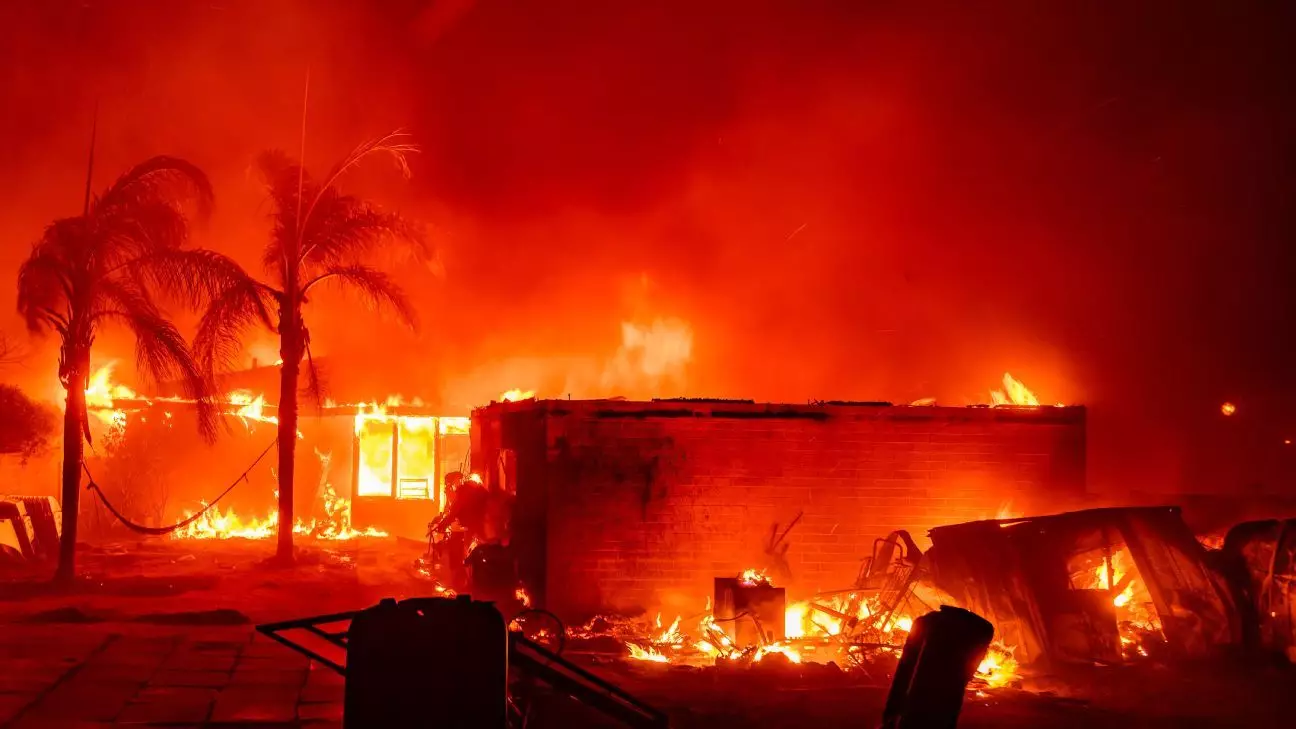The catastrophic wildfires sweeping through Los Angeles have left the region in turmoil, prompting thousands to flee their homes while severely disrupting air quality. With both the public and private sectors reeling from the effects, the National Football League (NFL) finds itself in a precarious situation. As two playoff teams prepare to clash—namely the Minnesota Vikings and the Los Angeles Rams—the league is evaluating the potential disruption that these raging fires may pose to the highly anticipated Monday night wild-card playoff game at SoFi Stadium.
Reports indicate that the NFL is not merely on standby but has laid out a comprehensive contingency plan. In the event that conditions deteriorate further, they are prepared to relocate the game to State Farm Stadium in Glendale, Arizona—the home turf of the Arizona Cardinals. The league’s proactive approach aims to ensure the game proceeds smoothly, taking into account the previous instance in 2003 when a similar decision was made due to wildfires. The NFL’s assurance that backup plans are in place emphasizes their commitment to the health and safety of players, staff, and fans alike.
The Los Angeles Rams—currently headquartered in Woodland Hills, a neighborhood shielded by the Santa Monica Mountains from the nearest blazes—are not immune to the fallout from the wildfires. While team officials confirmed that no players or staff members have been directly affected, the looming threat remains a source of concern. Stars like Cooper Kupp have taken to social media, expressing solidarity with those impacted by the calamity and extending gratitude to the firefighters and first responders battling the flames.
However, the air quality in the surrounding areas tells a more troubling story. The air quality index has been fluctuating wildly, with readings soaring into “unhealthy” ranges, greatly affecting the Los Angeles Chargers, who will soon head out to Houston for another playoff showdown. With the air quality in their practice facility reaching alarming levels between 170 and 200, Chargers head coach Jim Harbaugh made a strategic decision to separate offensive and defensive units. This move aimed to mitigate exposure, even though it meant compromising typical practice routines.
As players from both teams prepare to compete, the deteriorating air quality hangs ominously over their heads. The region is mired in smoke and ash, with reports indicating that specific areas have reached an index as high as 300, categorized as “very unhealthy.” Inglewood, home to SoFi Stadium, recorded a dangerously high level of 281 Wednesday afternoon. Such conditions can not only pose immediate health risks but can also impact player performance, as they grapple with respiratory challenges during intense physical activity.
The Los Angeles Chargers are taking additional steps to prioritize their athletes’ health. In light of the ongoing situation, they announced a generous donation of $200,000 aimed at supporting organizations such as the American Red Cross and the Los Angeles Fire Department Foundation, along with initiatives focused on sheltering displaced animals. Such measures reflect both a commitment to community support and a recognition of the broader humanitarian crisis facing the region.
A Broader Environmental Context
Wildfires in California are not an infrequent occurrence; they’ve become a controversial hallmark of the state’s climate challenges. While primarily associated with the summer months, these seasonal fire threats are beginning to encroach into winter. Climate change, characterized by rising temperatures and reduced rainfall, appears to be pushing the wildfire season to both start earlier and extend later than ever before. The Los Angeles Fire Department’s request for off-duty firefighters underscores the overwhelming situation they are facing.
Despite expert projections, this year the flames have already claimed lives and caused injuries. With at least five fatalities reported, communities are left grappling with the devastating repercussions. The Western Fire Chiefs Association has corroborated that such fires could extend well into the winter months, particularly due to the delay in rains that typically dampen fire activity.
As the clock ticks down towards what should be an electrifying playoff game, the shadow of the wildfires looms large over Los Angeles. While contingencies are being prepared to ensure that football continues, the overarching reality remains that the health and well-being of both players and fans must take precedence. The NFL, along with the Chargers and Rams, faces not just a logistical challenge but a moral obligation to navigate gracefully through this crisis, recognizing the broader struggles of the communities they call home. Amidst the ongoing chaos, the hope remains that both the fires will be contained, and the joy of football can once again take center stage in Los Angeles.


Leave a Reply